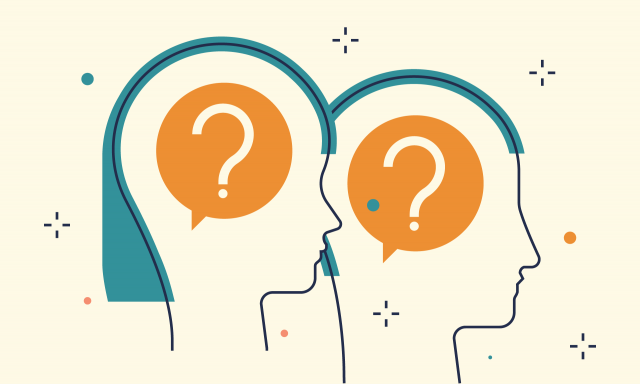

 Article
Article

 The questions we find ourselves asking in response to COVID-19 are complicated and colossal. But the act of asking questions together is a powerful activity for any community — and creates new possibilities for starting to overcome chaos. It is a crucial form of action that helps us creatively solve the problems before us.
The questions we find ourselves asking in response to COVID-19 are complicated and colossal. But the act of asking questions together is a powerful activity for any community — and creates new possibilities for starting to overcome chaos. It is a crucial form of action that helps us creatively solve the problems before us.

Written by
Now more than ever, we have questions. Lots of them. So many, in fact, that every realm of our lives — personal, professional, political, you name it — seems to have been branded with a white-hot question mark.
This unnerves us — and quite frankly, for good reason. Many of the questions we find ourselves asking in response to COVID-19 address tragedies we see unfolding right in front of us — tragedies of both life and livelihood. Many of them address future consequences we can see only dimly, if at all. Whatever the case, we are asking questions amid an unprecedented global pandemic that we don’t have a clear (or even unclear) vision for how to handle. To say we are unnerved by this often feels like an understatement.
And yet, despite the physical and psychological distance we’ve imposed for the time being, we’re acutely aware that our neighbors, both local and global, are asking many of the same questions we are — if not in word, then in essence. Even in our individual situations, we are united in asking deep, difficult questions of our shared past, present and future. And, though we are at a distance, we find ourselves asking questions together.
Recently, over 60 members of the Darden community did this very thing: We asked questions together — and in real time. Via Zoom, Professors Andy Wicks and Anton Korinek (a business ethicist and an economist, respectively) guided students through a deeply active, communal process of discussing a vast range of topics, focusing less on finding the answers and more on the value of the questions themselves. Students wondered, for instance:
When we see these questions all lined up, we might be tempted to see them only as an illustration of just how complicated, just how colossal the problems of this long moment are. We know this is true — the problems we face are complicated and colossal. But we cannot allow ourselves to see our questions only as a reminder of what we’re up against.
Indeed, we should see our questions both as a sobering way to realize the scale of the chaos we are in and as a pathway to seek together a deeper, more nuanced understanding of how to approach and, ultimately, to overcome it. When we ask questions together, we cultivate and nurture our communities — even the ones we can’t see — by revealing shared commitments, shared fears, shared hopes. Simply put, asking questions together is itself a powerful form of sharing, a necessary activity for any community.
Greater still, asking questions together creates new possibilities for starting to overcome the chaos even now, even in our current state of limitation. For only together will we actually arrive at the right questions to ask — and this is absolutely vital for both knowing how to approach our current isolated state and for stopping the virus itself. Asking questions together, then, should not be seen as a “warm-up” for the real “action” of direct, measurable problem-solving. Asking questions together is itself a crucial form of action, one that binds our communities in sharing and in creatively understanding and solving the problems before us.
The Darden community demonstrated powerfully its capability for just this. And rest assured, the Darden community will continue to demonstrate it — together always, even at a distance.
This article was developed with the support of Darden’s Institute for Business in Society, of which Andrew C. Wicks is an academic director and John Nolan is a research and programs associate.
An expert in macroeconomics, artificial intelligence, financial stability and international finance, Korinek currently researches the implications of AI for business, the economy and the future of work. His work has been featured in top journals and the mainstream media, including The Economist, The Wall Street Journal and Bloomberg.
In addition to serving as associate professor at both UVA’s Darden School of Business and Department of Economics, Korinek is a Research Associate at the National Bureau of Economic Research. Prior to his UVA appointments, he held positions at the University of Maryland as well as Johns Hopkins University, and he was a visiting scholar at Harvard University, the International Monetary Fund and the World Bank.
M.A., University of Vienna; Ph.D., Columbia University
Wicks specializes in ethics. He is an expert in international business ethics, corporate social responsibility and ethics in public life.
Wicks’ research interests include stakeholder responsibility, stakeholder theory, trust, health care ethics, total quality management and ethics, and entrepreneurship. Wicks also specializes in religion and public life, particularly as it pertains to businesses.
Wicks is co-author of three books — Managing for Stakeholders: Survival, Reputation and Success; Business Ethics: A Managerial Approach; and Stakeholder Theory: The State of the Art. He has published more than 30 journal articles in business ethics, management and the humanities.
B.A., University of Tennessee, Knoxville; M.A., Ph.D., University of Virginia
Distant but Together: The Binding Power of Questions Amid a Pandemic